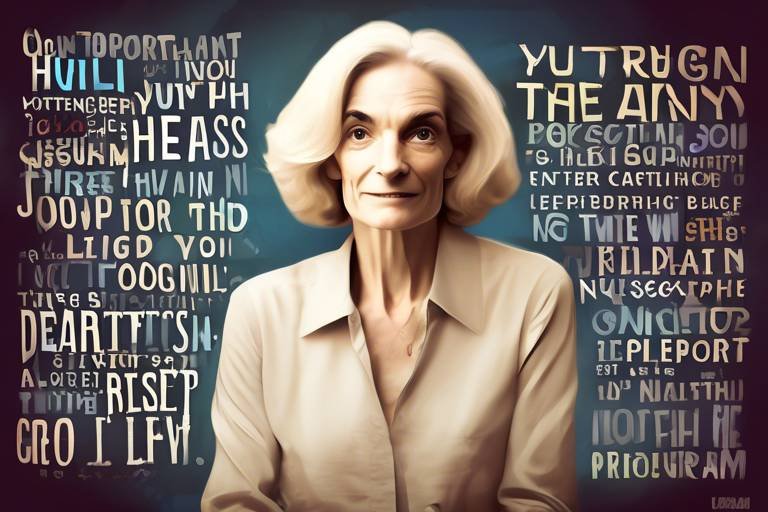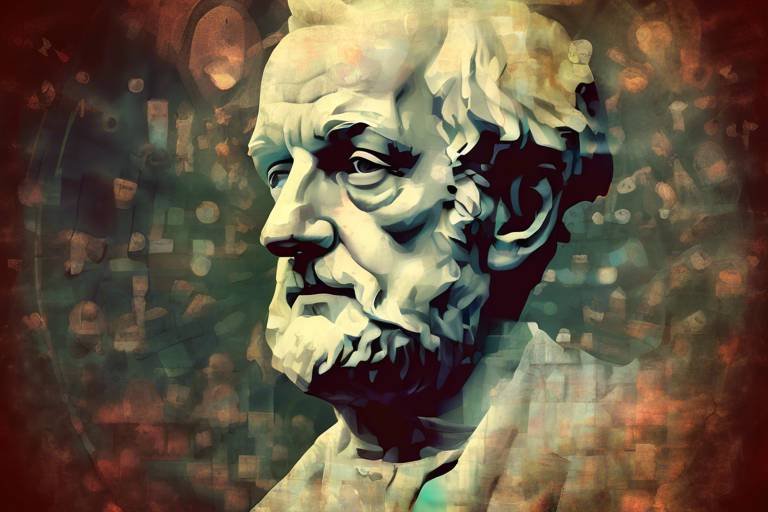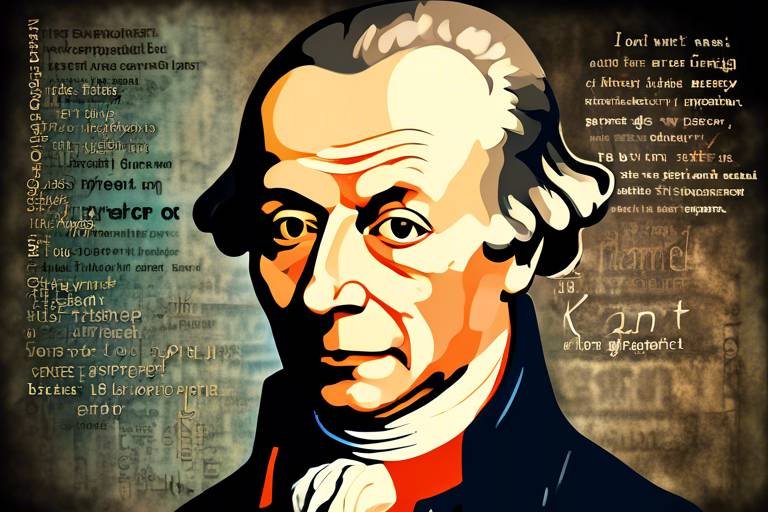Understanding Existentialism Through Jean-Paul Sartre's Works
Existentialism is not just a philosophical movement; it's a profound exploration of what it means to be human. At the heart of this philosophy lies the idea that individuals are free and responsible for their own choices, a theme that Jean-Paul Sartre masterfully illustrates in his works. Sartre challenges us to confront the reality of our existence, pushing us to acknowledge that we are the architects of our own lives. This article takes you on a journey through Sartre's existentialist thought, unraveling the intricate tapestry of freedom, choice, and the often uncomfortable truths about human existence.
What makes existentialism so compelling? It’s the way it resonates with our everyday experiences. When we wake up each day, we are faced with choices that shape our identity and future. Sartre's philosophy encourages us to embrace this freedom rather than shy away from it. He insists that while we may feel overwhelmed by the weight of our decisions, it is this very burden that allows us to carve out our own paths in life. In a world that often feels chaotic and indifferent, Sartre's existentialism serves as a beacon, reminding us that we have the power to define our essence through our actions.
Throughout his life, Sartre produced a rich body of work that delves into these themes, providing insights that remain relevant today. His novels, plays, and philosophical essays are not just academic texts; they are invitations to engage with the complexities of existence. By examining Sartre's major works, we can gain a deeper understanding of how he articulates the struggles of the human condition, the quest for authenticity, and the intricate dynamics of human relationships.
As we explore Sartre's ideas, we will encounter concepts like 'being-for-itself' and 'being-in-itself,' which reveal the dual nature of existence and consciousness. We will also reflect on the notion of freedom and its accompanying anxieties, as well as the importance of authenticity in a world filled with societal pressures. Ultimately, this exploration will not only illuminate Sartre's philosophy but also encourage us to reflect on our own lives and the choices we make.
Existentialism emphasizes individual freedom and choice. This section delves into its core principles, highlighting how Sartre's thoughts challenge traditional philosophical views and advocate for personal responsibility in shaping one's identity.
An overview of Sartre's key literary and philosophical works, such as Being and Nothingness and Nausea. This section discusses how these texts encapsulate existentialist themes and contribute to the broader understanding of human existence.
Being and Nothingness is Sartre's seminal work that explores the nature of existence, consciousness, and freedom. This section analyzes the book's central arguments and their relevance to existentialist thought.
Sartre distinguishes between 'being-for-itself' and 'being-in-itself' in his exploration of consciousness. This subsection examines how these concepts illustrate the struggle for self-definition in an indifferent universe.
Freedom is a cornerstone of Sartre's philosophy. This subsection discusses how Sartre articulates the burden of freedom and the anxiety it generates, emphasizing the importance of choice in human life.
In Nausea, Sartre presents existential angst through the protagonist's experiences. This section explores the themes of absurdity and alienation, illustrating how they reflect Sartre's views on existence and human emotions.
Authenticity is crucial in Sartre's existentialism. This section examines how individuals can achieve authenticity by embracing their freedom and making conscious choices that align with their true selves.
Living authentically involves acknowledging one's freedom and the responsibility that comes with it. This subsection discusses practical ways individuals can strive for authenticity in their lives.
Despite the importance of authenticity, various societal pressures can hinder it. This subsection explores these challenges and suggests strategies for overcoming them while remaining true to oneself.
Sartre's existentialism has profound implications for human relationships. This section discusses how freedom, choice, and authenticity influence interpersonal dynamics and the concept of the Other.
Sartre’s idea of The Look illustrates how individuals perceive and objectify one another. This subsection examines how this concept affects self-identity and relationships in an existential context.
The interplay between love and freedom is complex in Sartre's philosophy. This subsection discusses how true love respects individual freedom while also navigating the challenges of dependence and attachment.
- What is existentialism? Existentialism is a philosophical movement that emphasizes individual freedom, choice, and the search for meaning in an indifferent universe.
- Who is Jean-Paul Sartre? Jean-Paul Sartre was a French philosopher, playwright, and novelist known for his contributions to existentialism and his exploration of human freedom and responsibility.
- What are Sartre's major works? Some of Sartre's major works include Being and Nothingness, Nausea, and No Exit.
- How does Sartre define freedom? Sartre defines freedom as the ability to make choices and the responsibility that comes with those choices, which can lead to anxiety and existential angst.
- What is authenticity in existentialism? Authenticity refers to living in accordance with one's true self and values, embracing freedom and responsibility in one's choices.

The Essence of Existentialism
Existentialism is a philosophical movement that places a significant emphasis on individual freedom and the importance of personal choice. At its core, existentialism challenges the traditional philosophical views that often prioritize abstract concepts over the lived experiences of individuals. Think about it: in a world filled with conventions and societal norms, existentialism urges us to break free from the shackles of conformity and take responsibility for our own lives. This philosophy suggests that we are not just products of our environment or predetermined by fate; rather, we are the architects of our own identities.
Jean-Paul Sartre, one of the most prominent figures of existentialism, famously stated, "Existence precedes essence." This means that people are born without any inherent purpose or identity; instead, they must forge their own paths through choices and actions. In a way, it's like being handed a blank canvas and a palette of colors but no instruction manual. The beauty—and the burden—lies in the freedom to paint your own picture of life, filled with your unique experiences, desires, and values.
Sartre’s philosophy posits that with this freedom comes responsibility. Every choice we make defines us, and therefore, we must be mindful of our decisions. This aspect of existentialism can be both liberating and daunting. Imagine standing at a crossroads, where every path represents a different life choice. The weight of that decision can be overwhelming, yet it is also what makes life rich and meaningful.
Moreover, existentialism emphasizes the significance of authenticity. To live authentically means to embrace one's freedom and make choices that genuinely reflect one's true self. It’s about peeling back the layers of societal expectations and discovering who you are at your core. This journey toward authenticity can be likened to navigating through a dense fog; it requires courage to push through the uncertainty and emerge into clarity.
In essence, existentialism invites individuals to confront the absurdity of life and to find meaning in their own existence. It encourages a profound exploration of self, urging us to ask questions like: Who am I? What do I want? What does it mean to live a meaningful life? The answers to these questions are not universal; they are deeply personal and can vary from one individual to another.
As we delve deeper into Sartre's major works, we will uncover how these themes of freedom, choice, and authenticity manifest in his writings, providing a richer understanding of what it means to exist in a world that often feels indifferent to our struggles and aspirations.
In conclusion, the essence of existentialism lies in its call for individuals to embrace their freedom, take responsibility for their choices, and strive for authenticity in their lives. It’s a philosophy that resonates with anyone who has ever felt the weight of societal expectations or the desire to carve out their own path in life.
- What is existentialism? Existentialism is a philosophical movement that focuses on individual freedom, choice, and the search for meaning in an indifferent universe.
- Who is Jean-Paul Sartre? Jean-Paul Sartre was a French philosopher, playwright, and novelist, widely regarded as one of the leading figures in existentialism.
- What does 'existence precedes essence' mean? This phrase indicates that individuals are born without a predefined purpose and must create their own identities through their choices and actions.
- How does existentialism relate to authenticity? Authenticity in existentialism refers to living in accordance with one's true self, embracing freedom, and making choices that reflect personal values.

Sartre's Major Works
Jean-Paul Sartre, one of the most influential philosophers of the 20th century, produced a remarkable body of work that profoundly shaped existentialist thought. His major works, including Being and Nothingness and Nausea, encapsulate the essence of existentialism and offer a lens through which we can examine the complexities of human existence. Each of these texts serves as a cornerstone in understanding Sartre's philosophical inquiries into freedom, identity, and the human condition.
Being and Nothingness, published in 1943, is often regarded as Sartre's magnum opus. In this extensive philosophical treatise, he delves into the nature of existence and consciousness, laying bare the intricacies of human freedom and the burdens that accompany it. Sartre's exploration of 'being-for-itself' and 'being-in-itself' challenges traditional metaphysical views and urges readers to confront the realities of their own existence. This work is not just a philosophical text; it’s a call to awaken to the possibilities of life and the responsibilities that come with it.
On the other hand, Nausea, published in 1938, presents a more narrative approach to existential angst. Through the eyes of its protagonist, Antoine Roquentin, Sartre explores feelings of absurdity and alienation that arise from the realization of one’s existence in a seemingly indifferent universe. The vivid descriptions of Roquentin's experiences serve as a mirror reflecting the internal struggles many face when confronted with the meaninglessness of life. This novel is a poignant reminder that the search for meaning is a deeply personal journey, fraught with challenges and revelations.
Both of these works contribute significantly to the broader understanding of human existence. They invite readers to engage with profound questions about identity and choice. To further illustrate the impact of Sartre's literature, here’s a brief comparison of these two seminal texts:
| Work | Type | Key Themes | Impact |
|---|---|---|---|
| Being and Nothingness | Philosophical Treatise | Existence, Consciousness, Freedom | Foundation of Existentialist Philosophy |
| Nausea | Novel | Absurdity, Alienation | Exploration of Existential Angst |
Through these works, Sartre not only articulates the principles of existentialism but also challenges readers to reflect on their own lives. He encourages us to embrace our freedom and confront the anxiety that comes with the awareness of our existence. In a world that often feels chaotic and uncertain, Sartre's writings serve as a guiding light, urging us to take ownership of our choices and live authentically.
In conclusion, Sartre's major works are essential for anyone looking to understand existentialism. They provide a rich tapestry of ideas that resonate with the struggles of modern life, emphasizing the importance of individual agency. As we navigate our own paths, the lessons gleaned from Sartre's philosophy remain ever relevant, reminding us that our existence is defined not by external circumstances, but by the choices we make.

Being and Nothingness
is not just a title; it’s a profound exploration of existence itself. In this seminal work, Jean-Paul Sartre dives deep into the essence of human consciousness and the nature of freedom. It’s like peeling an onion, layer by layer, revealing the complexities of what it means to be alive and aware. Sartre argues that existence precedes essence, meaning that we are not born with a predetermined purpose; instead, we create our own essence through our choices and actions. This idea is revolutionary, challenging the traditional philosophical views that suggest our nature is defined before we even arrive in this world.
At the heart of lies the distinction between two types of being: being-for-itself and being-in-itself. The former refers to conscious beings—humans who are aware of their existence and capable of reflecting on it. In contrast, being-in-itself describes objects that exist without consciousness. Imagine a rock: it simply is, without the burden of choice or self-awareness. Sartre uses these concepts to illustrate the struggle for self-definition in a universe that often feels indifferent to our desires and aspirations. This struggle is not just philosophical; it’s deeply personal and resonates with anyone who has ever felt lost or overwhelmed by the weight of their own choices.
One of the most compelling arguments in this work is the notion of freedom. Sartre posits that with freedom comes responsibility, and this duality can lead to a profound sense of anxiety. Think about it: being free means that every choice you make shapes your identity and your future. This is exhilarating yet terrifying. Sartre emphasizes that we cannot escape this burden; we must confront it head-on. Freedom is not merely about having options; it’s about owning the consequences of our choices and recognizing that we are the architects of our own lives. This perspective invites us to embrace our freedom, but it also challenges us to accept the weight of our decisions.
To further illustrate these ideas, let’s look at a simple table that summarizes the key distinctions Sartre makes in :
| Type of Being | Description |
|---|---|
| Being-for-itself | Conscious beings with self-awareness and the ability to reflect on their existence. |
| Being-in-itself | Objects that exist without consciousness or the ability to reflect. |
In conclusion, is a foundational text in existential philosophy that challenges us to reconsider our understanding of existence. Sartre's exploration of consciousness, freedom, and the human condition encourages us to take ownership of our lives, to embrace our freedom, and to define our essence through our choices. It’s a call to action, urging us to live authentically and to recognize the power we hold in shaping our own destinies.
- What is the main idea of Being and Nothingness?
It explores the nature of existence, consciousness, and freedom, emphasizing that existence precedes essence. - How does Sartre define freedom?
Sartre defines freedom as the ability to make choices, but with that freedom comes the responsibility for those choices. - What are the two types of being Sartre discusses?
Sartre distinguishes between 'being-for-itself' (conscious beings) and 'being-in-itself' (non-conscious objects).

and
This article explores the fundamental concepts of existentialism as illustrated in the works of Jean-Paul Sartre, shedding light on his philosophy and its implications for human existence and freedom.
Existentialism emphasizes individual freedom and choice. This section delves into its core principles, highlighting how Sartre's thoughts challenge traditional philosophical views and advocate for personal responsibility in shaping one's identity.
An overview of Sartre's key literary and philosophical works, such as Being and Nothingness and Nausea. This section discusses how these texts encapsulate existentialist themes and contribute to the broader understanding of human existence.
Being and Nothingness is Sartre's seminal work that explores the nature of existence, consciousness, and freedom. This section analyzes the book's central arguments and their relevance to existentialist thought.
Sartre distinguishes between 'being-for-itself' and 'being-in-itself' in his exploration of consciousness. This subsection examines how these concepts illustrate the struggle for self-definition in an indifferent universe.
Freedom is a cornerstone of Sartre's philosophy. This subsection discusses how Sartre articulates the burden of freedom and the anxiety it generates, emphasizing the importance of choice in human life.
In Nausea, Sartre presents existential angst through the protagonist's experiences. This section explores the themes of absurdity and alienation, illustrating how they reflect Sartre's views on existence and human emotions.
Authenticity is crucial in Sartre's existentialism. This section examines how individuals can achieve authenticity by embracing their freedom and making conscious choices that align with their true selves.
Living authentically involves acknowledging one's freedom and the responsibility that comes with it. This subsection discusses practical ways individuals can strive for authenticity in their lives.
Despite the importance of authenticity, various societal pressures can hinder it. This subsection explores these challenges and suggests strategies for overcoming them while remaining true to oneself.
Sartre's existentialism has profound implications for human relationships. This section discusses how freedom, choice, and authenticity influence interpersonal dynamics and the concept of the Other.
Sartre’s idea of The Look illustrates how individuals perceive and objectify one another. This subsection examines how this concept affects self-identity and relationships in an existential context.
The interplay between love and freedom is complex in Sartre's philosophy. This subsection discusses how true love respects individual freedom while also navigating the challenges of dependence and attachment.
- What is existentialism? Existentialism is a philosophical movement that emphasizes individual freedom, choice, and the inherent meaninglessness of life, which individuals must navigate to create their own purpose.
- How does Sartre define freedom? Sartre defines freedom as the ability to make choices and the responsibility that comes with those choices, often leading to feelings of anxiety and burden.
- What is the significance of authenticity in Sartre's philosophy? Authenticity is central to Sartre’s existentialism; it involves living in accordance with one’s true self and making conscious choices that reflect personal values and beliefs.
- How do Sartre's ideas apply to modern relationships? Sartre’s ideas suggest that genuine relationships respect individual freedom and encourage authentic connections, despite societal pressures and expectations.

Nausea.
Nausea is not just a title; it encapsulates the essence of existential angst that Jean-Paul Sartre masterfully portrays through the experiences of his protagonist, Antoine Roquentin. The narrative unfolds in a world where the protagonist grapples with the absurdity of existence, leading him to a profound sense of alienation. Imagine waking up one day and realizing that everything around you—the people, the objects, the very fabric of reality—seems devoid of meaning. This is the unsettling journey Sartre takes us on, forcing us to confront the discomfort that arises when we acknowledge the absurdity of life.
Throughout the novel, Roquentin experiences moments of intense existential reflection. He becomes acutely aware of his surroundings and the inherent meaninglessness that permeates them. For instance, he describes a simple chestnut tree, which, in its stillness, becomes a symbol of the indifference of the universe. This awareness leads to a visceral reaction—nausea—representing the profound disconnection he feels from the world. It's as if Sartre is saying, "Look closely at your life; the more you see, the more you realize just how absurd it is."
One of the key themes in Nausea is the idea of alienation. Roquentin's experiences illustrate how individuals can feel isolated in a world that seems to move on without them. He encounters people, yet feels an insurmountable distance between himself and others. This alienation is not just physical; it's existential. It raises questions about the nature of human relationships and the struggle to connect in a world that often feels indifferent to our existence.
Moreover, Sartre delves into the concept of freedom within the narrative. Roquentin's journey is not just about recognizing the absurdity of life; it's also about understanding the burden of freedom that comes with it. When one realizes that life lacks inherent meaning, the weight of choice becomes both liberating and terrifying. Roquentin grapples with the notion that he is free to create his own meaning, but this freedom is accompanied by a profound sense of responsibility. What does it mean to live authentically in a world that offers no guidelines? This question resonates deeply throughout the novel.
In essence, Nausea serves as a powerful exploration of existential themes that challenge readers to reflect on their own lives. Sartre invites us to confront the discomfort of existence and to embrace the freedom that comes with acknowledging our own absurdity. It’s a call to live authentically, to recognize our choices, and to take responsibility for the meaning we create in our lives.
- What is the main theme of Nausea?
The main theme revolves around existential angst, alienation, and the absurdity of life.
- How does Sartre depict freedom in Nausea?
Sartre illustrates freedom as both a blessing and a burden, emphasizing the responsibility that comes with making choices in an indifferent universe.
- What does the protagonist, Roquentin, struggle with?
Roquentin struggles with feelings of alienation and the search for meaning in a seemingly meaningless world.

This section discusses how these texts encapsulate existentialist themes and contribute to the broader understanding of human existence.
Jean-Paul Sartre's literary and philosophical contributions are monumental in the realm of existentialism, serving as a beacon for those seeking to understand the intricacies of human existence. His major works, particularly Being and Nothingness and Nausea, are not just mere texts; they are profound explorations into the depths of human consciousness, freedom, and the often overwhelming sense of absurdity that accompanies our existence. These works encapsulate existentialist themes in ways that resonate deeply with readers, encouraging a personal reflection on identity and purpose.
In Being and Nothingness, Sartre delves into the nature of existence itself. He presents a compelling argument that existence precedes essence, meaning that individuals are not born with a predetermined purpose but instead must create their own essence through actions and choices. This concept challenges traditional philosophical views that suggest a fixed human nature. By emphasizing the role of personal responsibility in shaping one's identity, Sartre invites readers to confront the weight of their freedom. The text is filled with intricate analyses of consciousness, where Sartre distinguishes between 'being-for-itself' and 'being-in-itself.' This distinction forms the backbone of his exploration of self-definition in a universe indifferent to our struggles.
Nausea, on the other hand, presents a more visceral experience of existential angst. Through the eyes of the protagonist, Antoine Roquentin, Sartre illustrates the feelings of absurdity and alienation that can arise when one confronts the meaningless nature of existence. Roquentin's encounters with the world lead him to a profound sense of nausea, a physical manifestation of his realization that life lacks inherent meaning. This narrative not only captures the essence of existential despair but also serves as a mirror for readers, prompting them to reflect on their own experiences of disconnection and the search for meaning in a chaotic world.
Both of these works contribute significantly to the broader understanding of human existence, as they compel readers to grapple with uncomfortable truths about their freedom, choices, and the often harsh realities of life. Sartre’s existentialism is not merely an academic philosophy; it is a lived experience that resonates with the struggles of everyday individuals. His writings challenge us to embrace our freedom while recognizing the responsibilities that accompany it, ultimately pushing us towards a more authentic existence.
In summary, Sartre's major works encapsulate existentialist themes that are crucial for understanding the human condition. They encourage a deep, personal engagement with the concepts of freedom, identity, and authenticity, making them essential reading for anyone seeking to navigate the complexities of existence in a meaningful way.
- What is existentialism?
Existentialism is a philosophical movement that emphasizes individual freedom, choice, and the inherent absurdity of life. It explores the challenges of human existence and the responsibility that comes with freedom. - How does Sartre define freedom?
Sartre views freedom as a fundamental aspect of human existence, where individuals are responsible for their choices and must create their own essence through their actions. - What themes are prevalent in Sartre's works?
Key themes in Sartre's works include absurdity, alienation, authenticity, and the struggle for self-definition in an indifferent universe. - Why is authenticity important in existentialism?
Authenticity is crucial as it represents the alignment of one's actions with their true self, allowing individuals to live meaningfully and responsibly in the face of freedom.

Being and Nothingness
is not just a book; it's a deep dive into the very essence of our existence. Jean-Paul Sartre takes us on a philosophical journey that challenges our understanding of consciousness, freedom, and what it means to truly exist. Imagine standing at the edge of a vast ocean, contemplating the depths of water below. This is akin to the exploration Sartre undertakes, where each wave represents a different facet of human experience, and the ocean itself symbolizes the complexity of existence.
At its core, this seminal work distinguishes between two types of being: ‘being-for-itself’ and ‘being-in-itself’. The former refers to conscious beings—those who have the capacity for self-reflection and awareness. In contrast, ‘being-in-itself’ describes objects that exist without consciousness, mere things in the world. Sartre argues that our ability to reflect on our existence gives us a unique position in the universe, but it also comes with a heavy burden. We are not just passive observers; we are active participants in shaping our identities.
This leads us to the pivotal concept of freedom. Sartre posits that with consciousness comes the responsibility of choice. He famously states, “We are condemned to be free.” This phrase encapsulates the paradox of human existence: while we have the power to make choices, we also bear the weight of those choices and their consequences. It's like being handed the keys to a car without any instructions—exciting yet terrifying. Every decision we make carves out our identity, but it also leaves us vulnerable to the anxiety that accompanies such freedom.
To illustrate these ideas, Sartre presents a series of examples and thought experiments that challenge readers to confront their own existence. For instance, he invites us to consider a person who is faced with a life-altering decision. This individual must navigate the complexities of choice, weighing personal desires against societal expectations. In doing so, Sartre emphasizes that our choices define us, and in a world devoid of inherent meaning, it is up to each individual to create their own essence.
As we delve deeper into , we encounter the notion of bad faith. This term refers to the self-deception that arises when individuals deny their freedom and responsibility. It's akin to wearing blinders—focusing on the immediate and comfortable while ignoring the broader implications of our choices. Sartre argues that many people live in bad faith, succumbing to societal norms and expectations rather than embracing their authentic selves. This denial ultimately leads to a sense of alienation and dissatisfaction, as individuals fail to recognize their true potential.
In summary, serves as a profound exploration of the human condition. Through Sartre's lens, we come to understand that our existence is defined by our consciousness, our choices, and our relationships with others. The struggle between being-for-itself and being-in-itself encapsulates the essence of existentialism, urging us to confront the freedom we possess while navigating the complexities of life.
- What is the main idea of Being and Nothingness?
Being and Nothingness explores the nature of existence, consciousness, and freedom, emphasizing the importance of individual choice and responsibility. - What does Sartre mean by 'bad faith'?
Bad faith refers to self-deception, where individuals deny their freedom and responsibility by conforming to societal norms instead of embracing their authentic selves. - How does Sartre differentiate between 'being-for-itself' and 'being-in-itself'?
'Being-for-itself' refers to conscious beings capable of self-reflection, while 'being-in-itself' describes objects that exist without consciousness.

Being and Nothingness
This article explores the fundamental concepts of existentialism as illustrated in the works of Jean-Paul Sartre, shedding light on his philosophy and its implications for human existence and freedom.
Existentialism emphasizes individual freedom and choice. This section delves into its core principles, highlighting how Sartre's thoughts challenge traditional philosophical views and advocate for personal responsibility in shaping one's identity.
An overview of Sartre's key literary and philosophical works, such as and Nausea. This section discusses how these texts encapsulate existentialist themes and contribute to the broader understanding of human existence.
is Sartre's seminal work that explores the nature of existence, consciousness, and freedom. In this profound text, Sartre lays out his ideas about what it means to exist, delving deep into the intricacies of human consciousness. He presents a world where existence precedes essence, meaning that individuals are not born with a predetermined purpose but rather create their own through choices and actions. This radical departure from traditional views of identity challenges readers to confront the weight of their freedom and the responsibility that comes with it.
Sartre distinguishes between 'being-for-itself' and 'being-in-itself' in his exploration of consciousness. The former refers to conscious beings, like humans, who are aware of their own existence and have the ability to reflect on their choices. In contrast, 'being-in-itself' describes objects that simply exist without consciousness or self-awareness. This distinction illustrates the struggle for self-definition in an indifferent universe, highlighting how individuals must navigate their existence amidst a world that often feels chaotic and devoid of inherent meaning.
Freedom is a cornerstone of Sartre's philosophy. He articulates that with freedom comes the burden of choice, leading to feelings of anxiety and responsibility. Sartre famously states, "We are condemned to be free," emphasizing that individuals cannot escape the necessity of making choices. This section discusses how Sartre articulates the burden of freedom and the anxiety it generates, emphasizing the importance of choice in human life. It is through our decisions that we shape our identities and influence the world around us, a process that can be both liberating and terrifying.
In Nausea, Sartre presents existential angst through the protagonist's experiences. This section explores the themes of absurdity and alienation, illustrating how they reflect Sartre's views on existence and human emotions.
Authenticity is crucial in Sartre's existentialism. This section examines how individuals can achieve authenticity by embracing their freedom and making conscious choices that align with their true selves.
Living authentically involves acknowledging one's freedom and the responsibility that comes with it. This subsection discusses practical ways individuals can strive for authenticity in their lives.
Despite the importance of authenticity, various societal pressures can hinder it. This subsection explores these challenges and suggests strategies for overcoming them while remaining true to oneself.
Sartre's existentialism has profound implications for human relationships. This section discusses how freedom, choice, and authenticity influence interpersonal dynamics and the concept of the Other.
Sartre’s idea of the Look illustrates how individuals perceive and objectify one another. This subsection examines how this concept affects self-identity and relationships in an existential context.
The interplay between love and freedom is complex in Sartre's philosophy. This subsection discusses how true love respects individual freedom while also navigating the challenges of dependence and attachment.
- What is the main idea of Sartre's existentialism?
Sartre's existentialism centers on the belief that existence precedes essence, meaning individuals create their own meaning and identity through choices. - How does Sartre define freedom?
For Sartre, freedom is the ability to choose, which comes with the burden of responsibility and the anxiety that accompanies such choices. - What are 'being-for-itself' and 'being-in-itself'?
'Being-for-itself' refers to conscious beings who can reflect and make choices, while 'being-in-itself' refers to objects that exist without consciousness.

is Sartre's seminal work that explores the nature of existence, consciousness, and freedom. This section analyzes the book's central arguments and their relevance to existentialist thought.
Being and Nothingness is not just a book; it's a profound exploration of the very essence of existence itself. Sartre dives deep into the intricacies of consciousness and the concept of freedom, challenging readers to confront the uncomfortable truths about their own lives. The book is structured in a way that encourages us to question not only the world around us but also our place within it. Sartre distinguishes between two fundamental modes of being: 'being-for-itself' and 'being-in-itself'. This distinction is crucial as it lays the groundwork for understanding human consciousness and the struggle for self-definition in what he describes as an indifferent universe.
The concept of 'being-for-itself' refers to the conscious being, the self-aware individual who has the ability to reflect, choose, and create meaning in their life. On the flip side, 'being-in-itself' represents objects that simply exist without consciousness or purpose. This dichotomy reflects Sartre's belief that while we are thrown into existence without our consent, it is our responsibility to define ourselves through our choices and actions. This idea resonates deeply with existentialist thought, where the act of choosing becomes a defining characteristic of what it means to be human.
One of the most compelling arguments in Being and Nothingness is the notion of freedom. Sartre posits that with freedom comes the burden of responsibility. The realization that we are free to make choices can often lead to feelings of anxiety and despair. This is because every choice we make not only defines who we are but also shapes our future. In this sense, freedom is a double-edged sword; it empowers us, yet it also exposes us to the weight of our decisions. Sartre famously stated, "Man is condemned to be free," emphasizing that while we have the power to choose, we cannot escape the consequences of those choices.
To illustrate these concepts further, Sartre uses various examples and thought experiments throughout the text. He encourages readers to reflect on their own lives and the choices they make daily. This self-reflection is vital for achieving authenticity, a key tenet of existentialism. By understanding the nature of our existence and the freedom we possess, we can begin to live more authentically, aligning our actions with our true selves.
In summary, Being and Nothingness serves as a cornerstone of existentialist philosophy, urging us to confront our existence, embrace our freedom, and accept the responsibility that comes with it. Sartre’s exploration of consciousness and the nature of being not only challenges traditional philosophical views but also empowers individuals to take charge of their own identities in a world that often feels chaotic and indifferent.

The Concept of 'Being'
In his exploration of existentialism, Jean-Paul Sartre introduces the profound distinction between 'being-for-itself' and 'being-in-itself'. These concepts are not just philosophical jargon; they represent the very essence of human existence and our relationship with the world around us. To put it simply, 'being-for-itself' refers to conscious beings—humans who are aware of their existence, their choices, and the weight of their freedom. In contrast, 'being-in-itself' describes inanimate objects or beings that lack consciousness and self-awareness, existing without the burden of choice or responsibility.
This differentiation is crucial because it highlights the struggle that individuals face in defining themselves in a universe that often feels indifferent. Imagine standing in front of a mirror, not just seeing your reflection but grappling with the question of who you truly are. Sartre argues that we are condemned to be free, meaning we must constantly confront the choices we make and the identities we forge. This struggle for self-definition can be both liberating and daunting, as it places the onus of existence squarely on our shoulders.
Consider the following aspects of 'being-for-itself' and 'being-in-itself' as a way to grasp their significance:
| Aspect | Being-for-itself | Being-in-itself |
|---|---|---|
| Consciousness | Self-aware, reflective | Non-conscious, unaware |
| Freedom | Endless choices and responsibilities | No choices, no responsibility |
| Identity | Constantly evolving through choices | Fixed, unchanging |
As we navigate through life, the tension between these two modes of being can lead to feelings of existential angst. This angst arises from the realization that our existence is not predetermined; we are not merely players in a script written by someone else. Instead, we are the authors of our own narratives, crafting our identities through our choices and actions. In this sense, Sartre’s philosophy invites us to embrace our freedom, even when it feels overwhelming. It's like being handed a blank canvas and a palette of colors—what you create is entirely up to you, but the responsibility for that creation can be a heavy burden.
Ultimately, the concept of 'being' in Sartre's existentialism serves as a powerful reminder of our agency in a world that often seems chaotic and indifferent. By understanding the distinction between 'being-for-itself' and 'being-in-itself', we can better appreciate the complexities of our existence and the importance of our choices in shaping who we are. So, the next time you find yourself questioning your identity or purpose, remember that you have the freedom to define your own 'being' in this vast universe.

The Notion of Freedom
Freedom is not just a buzzword in Jean-Paul Sartre's existential philosophy; it is the very essence of what it means to be human. In his view, freedom is both a gift and a burden, a duality that shapes our existence in profound ways. Sartre argues that we are "condemned to be free," meaning that while we possess the ability to make choices, we also bear the weight of the consequences that come with those choices. This concept can be daunting, as it places the responsibility of our actions squarely on our shoulders.
Imagine standing at a crossroads, with countless paths stretching out before you. Each path represents a choice, a direction for your life. The freedom to choose is exhilarating, but it can also lead to a paralyzing sense of anxiety. This is what Sartre refers to as the "angst" of freedom. He believes that the awareness of our freedom forces us to confront the reality that we are the architects of our own lives. We cannot blame external forces or fate for our situations; instead, we must accept that our choices define us.
Moreover, Sartre emphasizes that freedom is inherently linked to responsibility. When we make a choice, we not only shape our own lives but also influence the lives of others. This interconnectedness means that our decisions carry weight, and we must consider their impact on those around us. For Sartre, this is where the notion of "bad faith" comes into play. Bad faith occurs when individuals deceive themselves to escape the anxiety of freedom by blaming their circumstances or adhering to societal norms without question. In doing so, they relinquish their freedom and authenticity.
To illustrate the complexities of freedom, consider the following key points:
- Choice and Consequence: Every choice we make has implications that can ripple through our lives and the lives of others.
- Freedom and Anxiety: The awareness of our freedom can lead to feelings of unease as we grapple with the weight of our decisions.
- Responsibility: With freedom comes the obligation to take ownership of our choices and their outcomes.
- Bad Faith: The act of denying our freedom by blaming external factors can hinder our personal growth and authenticity.
Ultimately, Sartre's exploration of freedom invites us to engage with our lives actively. It challenges us to embrace the choices we make, to acknowledge the responsibility they entail, and to live authentically in a world that often tries to impose limits on our freedom. By recognizing and confronting the anxiety that accompanies our freedom, we can begin to understand what it truly means to exist as individuals in a complex, often indifferent universe.
- What is existentialism? Existentialism is a philosophical movement that emphasizes individual freedom, choice, and the search for meaning in an often chaotic and indifferent world.
- How does Sartre define freedom? Sartre defines freedom as the ability to make choices and the responsibility that comes with those choices, suggesting that we are "condemned to be free."
- What is "bad faith" in Sartre's philosophy? "Bad faith" refers to the act of deceiving oneself to escape the anxiety of freedom by blaming external circumstances or conforming to societal expectations.
- Why is authenticity important in existentialism? Authenticity is crucial because it allows individuals to embrace their freedom and make choices that align with their true selves, rather than conforming to external pressures.

Nausea
is one of Jean-Paul Sartre’s most profound works, offering a deep dive into the tumultuous waters of existential angst. The novel follows the life of Antoine Roquentin, a man grappling with the meaning of existence in a world that feels overwhelmingly absurd. As Roquentin navigates his daily life, he becomes acutely aware of the unfathomable weight of existence, leading him to experience a profound sense of nausea that symbolizes his existential crisis. This nausea is not merely a physical sensation; it represents a deep-seated discomfort with the very nature of being. In essence, Sartre uses Roquentin’s journey to illustrate the struggle of individuals who confront the void of meaning in their lives.
Throughout the novel, Sartre explores several key themes that resonate with existentialist philosophy:
- Absurdity: Roquentin’s experiences reveal the absurd nature of life, where traditional values and meanings crumble under the weight of existential inquiry.
- Alienation: The protagonist feels increasingly isolated from those around him, highlighting the alienating effects of self-awareness and the search for meaning.
- Existential Freedom: Despite the despair, Roquentin ultimately confronts his freedom to choose how to respond to his experiences, a fundamental tenet of Sartre’s philosophy.
One of the most striking aspects of is how Sartre articulates the notion of existential angst. This feeling arises when one becomes painfully aware of the absence of inherent meaning in life. Roquentin’s encounters with the mundane—like the simple act of observing a chestnut tree—trigger a profound realization that existence precedes essence, a core principle of Sartre’s existentialism. He begins to see the world not as a place filled with predetermined meaning but as a blank canvas where individuals must create their own significance.
As the narrative unfolds, Roquentin's reflections lead him to a pivotal moment of self-realization. He understands that he is not bound by societal expectations or the roles imposed upon him. Instead, he recognizes that he has the power to define himself through his choices. This realization is both liberating and terrifying, encapsulating the essence of Sartre's philosophy: the burden of freedom comes with the responsibility to make choices that shape one's identity.
In conclusion, serves as a powerful exploration of existential themes, illustrating the conflict between the search for meaning and the inherent absurdity of life. Sartre masterfully crafts a narrative that challenges readers to confront their own existence and the choices that define them. Through Roquentin’s journey, we are reminded that while the world may be indifferent, it is our responsibility to create meaning in the face of absurdity.
- What is the main theme of Sartre's Nausea?
Nausea explores themes of absurdity, alienation, and the struggle for self-definition in a world devoid of inherent meaning. - How does Sartre define existential freedom?
Sartre defines existential freedom as the ability to make choices that shape one's identity, emphasizing that individuals are responsible for their own existence. - What does the protagonist experience in Nausea?
Antoine Roquentin experiences a profound sense of nausea as he grapples with the absurdity of life and the weight of existence.

Nausea,
In Nausea, Sartre dives deep into the turbulent waters of existential angst through the eyes of his protagonist, Antoine Roquentin. The novel is not merely a narrative; it’s a profound exploration of the absurdity of existence and the alienation that often accompanies it. Roquentin’s experiences serve as a mirror reflecting the chaotic nature of life, where meaning seems elusive and the weight of existence can feel overwhelming. Have you ever felt that gnawing sense of discomfort in your daily routine? That’s the essence of Roquentin’s journey—an awakening to the absurdity of life that leaves him grappling with feelings of nausea, hence the title.
Sartre artfully illustrates how Roquentin becomes increasingly aware of his surroundings, leading to a visceral realization that the world is indifferent to human existence. The protagonist's encounters with mundane objects and people evoke a profound sense of alienation. For instance, he describes the sensation of objects around him as if they are mocking his very being, emphasizing the disconnection one can feel in a seemingly apathetic universe. This sense of alienation is not just a personal struggle; it resonates with anyone who has ever felt out of place in their own life. Sartre uses Roquentin’s experiences to challenge readers to confront their own existential crises and the discomfort that often accompanies self-awareness.
The themes of absurdity and alienation are intricately woven throughout the narrative. Sartre compels us to question the nature of our existence and the societal norms that dictate our lives. Roquentin's reflections lead him to ponder the futility of seeking meaning in a world devoid of inherent purpose. This existential realization is akin to standing on a precipice, staring into the void, and grappling with the terror of infinite possibilities. How do we find meaning when the very foundation of our existence feels shaky? Sartre doesn’t provide easy answers; instead, he invites us to embrace the chaos and uncertainty of life.
Throughout Nausea, Sartre emphasizes the importance of individual perception and the subjective experience of reality. Roquentin’s journey is not just about his personal struggles; it reflects a universal human condition. As readers, we are encouraged to examine our own lives and the societal constructs that shape our identities. The novel serves as a powerful reminder that while we may feel isolated in our experiences, we are all navigating the same turbulent waters of existence. Sartre’s poignant exploration of these themes resonates deeply, prompting us to reflect on our own feelings of nausea in the face of life’s absurdities.
- What is the main theme of Nausea?
Nausea explores themes of absurdity, alienation, and the struggle for meaning in an indifferent universe. - Who is the protagonist of Nausea?
The protagonist is Antoine Roquentin, who experiences existential angst and a profound sense of disconnection from the world. - How does Sartre illustrate existentialism in Nausea?
Sartre uses Roquentin's experiences to depict the challenges of self-awareness and the search for meaning in a chaotic world. - What does the title Nausea signify?
The title represents the protagonist's visceral reaction to the absurdity of existence and the discomfort of self-awareness.

Sartre presents existential angst through the protagonist's experiences. This section explores the themes of absurdity and alienation, illustrating how they reflect Sartre's views on existence and human emotions.
In Nausea, Sartre presents existential angst through the protagonist's experiences, creating a vivid illustration of the human condition. The character, Antoine Roquentin, grapples with feelings of absurdity and alienation that resonate deeply with readers. As Roquentin navigates his world, he encounters a profound sense of disconnection from his surroundings and the people in his life. This overwhelming feeling of estrangement is not just a personal struggle; it reflects a universal truth about existence itself. Sartre masterfully uses Roquentin’s journey to convey that life can often feel meaningless, a notion that is at the heart of existentialist thought.
One of the most striking themes in Nausea is the concept of absurdity. Roquentin's experiences lead him to confront the randomness and chaos of life. He often reflects on the idea that existence precedes essence, meaning that individuals are not born with a predetermined purpose. Instead, they must create their own meaning in a world that offers none. This realization can be both liberating and terrifying, as it places the burden of choice squarely on the shoulders of the individual. Sartre illustrates this through Roquentin's moments of introspection, where he grapples with the fundamental questions of existence: "Why am I here?" and "What does it all mean?"
Furthermore, the theme of alienation permeates Roquentin's experiences. He feels disconnected not only from the world around him but also from his own identity. This sense of alienation is exacerbated by his interactions with others, which often feel superficial and unfulfilling. For instance, Roquentin's encounters with people like the self-absorbed and pompous figures in his life amplify his feelings of isolation. He perceives them as mere objects, devoid of depth or authenticity. This objectification reflects Sartre’s philosophical ideas about the 'Other' and how individuals can become alienated when they are reduced to mere objects in the eyes of others.
The interplay of absurdity and alienation in Nausea serves to highlight Sartre's views on existence and human emotions. The protagonist's journey is a poignant reminder that while life may often seem absurd and devoid of meaning, it is through our struggles and choices that we can carve out our own path. Sartre encourages readers to embrace their freedom, despite the anxiety it may bring. This existential angst is not something to be feared; rather, it is an integral part of the human experience that can lead to greater self-awareness and authenticity.
Ultimately, Sartre's exploration of these themes in Nausea invites us to confront our own feelings of absurdity and alienation. It challenges us to reflect on our existence and the choices we make, urging us to live authentically in a world that often feels chaotic and indifferent. In doing so, Sartre provides a powerful lens through which we can examine our own lives and the emotional landscapes we navigate daily.
- What is existentialism?
Existentialism is a philosophical movement that emphasizes individual freedom, choice, and the search for meaning in an indifferent universe.
- Who is Jean-Paul Sartre?
Jean-Paul Sartre was a French philosopher, playwright, and novelist, widely regarded as one of the leading figures of existentialist thought.
- What are the main themes in Sartre's works?
Key themes in Sartre's works include absurdity, alienation, freedom, and authenticity, all of which explore the complexities of human existence.
- How does Sartre define freedom?
Sartre views freedom as the ability to make choices and take responsibility for those choices, even in the face of an absurd and chaotic world.

The Role of Authenticity
Authenticity holds a pivotal place in Jean-Paul Sartre's existential philosophy. It is not merely a buzzword; rather, it encapsulates the essence of being true to oneself in a world filled with external pressures and societal expectations. Sartre believed that achieving authenticity requires a deep understanding of one's freedom and the choices that come with it. In a society that often pushes individuals towards conformity, the journey to authenticity becomes a radical act of defiance. By embracing our freedom, we can carve out our identities and live lives that reflect our true selves.
To grasp the significance of authenticity, we must first acknowledge that it involves a conscious decision-making process. This means that every choice we make contributes to our identity, whether we realize it or not. Sartre famously stated, "We are condemned to be free," highlighting that with freedom comes the burden of responsibility. This responsibility can be daunting, as it requires us to confront our fears, insecurities, and the expectations placed upon us by others. However, it is through this confrontation that we can emerge as authentic beings, capable of living with purpose and conviction.
Living authentically is not a one-time achievement; it is a continuous endeavor. It involves regularly assessing our values, beliefs, and desires to ensure they align with who we truly are. Here are a few practical ways to strive for authenticity in our daily lives:
- Self-Reflection: Take time to reflect on your values and goals. What truly matters to you? What do you want to achieve?
- Embrace Vulnerability: Being authentic means being open about your feelings and experiences. Don't be afraid to show your true self to others.
- Make Conscious Choices: Every decision you make should resonate with your true self. Avoid actions that feel forced or inauthentic.
Despite the importance of authenticity, the path is fraught with challenges. Societal norms and expectations can often hinder our ability to live authentically. For instance, the pressure to conform to certain lifestyles, career paths, or even relationships can create a disconnect between who we are and who we feel we should be. These pressures can lead to feelings of inadequacy and self-doubt, making it even more challenging to embrace our true selves.
To overcome these challenges, it is essential to cultivate resilience and self-awareness. Surrounding ourselves with supportive communities that encourage authenticity can also make a significant difference. Engaging in conversations about existential themes and sharing our experiences can help reinforce our commitment to living authentically. Remember, the journey to authenticity is not a solitary one; it is a shared experience that can foster deeper connections with others who are also seeking to break free from societal constraints.
In conclusion, authenticity is not just a philosophical concept; it is a vital component of living a fulfilling life. By embracing our freedom and taking responsibility for our choices, we can navigate the complexities of existence while remaining true to ourselves. Sartre's existentialism invites us to embark on this journey, reminding us that the quest for authenticity is both challenging and rewarding.
Q1: What does it mean to live authentically?
A1: Living authentically means being true to your values, beliefs, and desires, making choices that reflect your true self, and not conforming to societal pressures.
Q2: How can I start my journey towards authenticity?
A2: Begin with self-reflection to understand your core values and desires. Make conscious choices that align with who you are, and embrace vulnerability in your relationships.
Q3: What challenges might I face when trying to be authentic?
A3: Challenges include societal expectations, fear of judgment, and internal conflicts about your identity. Building a supportive community can help you navigate these obstacles.

Living Authentically
Living authentically is more than just a philosophical concept; it’s a way of life that invites us to embrace our true selves. Imagine waking up every day with a sense of purpose, knowing that your choices reflect who you genuinely are. Sartre believed that authenticity stems from recognizing our freedom and taking responsibility for our actions. This means shedding the layers of societal expectations and norms that often dictate our decisions. It’s about making choices that resonate with our inner values rather than conforming to external pressures.
To live authentically, one must first acknowledge the freedom we possess. This freedom can be exhilarating yet daunting. It’s like standing at the edge of a cliff, ready to leap into the unknown. The key is to understand that with this freedom comes the responsibility to shape our own destinies. Sartre famously said, “We are condemned to be free,” emphasizing that while we have the power to choose, we also bear the weight of those choices. So, how can we navigate this journey towards authenticity?
Here are a few practical steps to consider:
- Self-Reflection: Take time to understand your values, passions, and desires. Journaling or meditative practices can help clarify what truly matters to you.
- Set Boundaries: Learn to say no to things that don’t align with your authentic self. This might mean distancing yourself from toxic relationships or societal expectations.
- Embrace Vulnerability: Being authentic often requires vulnerability. Share your true thoughts and feelings with those you trust, allowing for deeper connections.
- Take Risks: Step out of your comfort zone. Whether it’s pursuing a new career or expressing your opinions, taking risks can lead to personal growth.
Living authentically is not a one-time achievement but a continuous journey. It’s about making conscious choices every day that reflect your true self. As you embark on this path, remember that it’s okay to stumble. Authenticity is not perfection; it’s about being real and honest with yourself and others. Embrace the messy, beautiful process of becoming who you are meant to be.
What does it mean to live authentically?
Living authentically means making choices that align with your true self, values, and beliefs, rather than conforming to societal expectations.
How can I start living authentically?
Begin with self-reflection to understand your core values, set boundaries, and embrace vulnerability. Taking risks can also help you grow into your authentic self.
Is living authentically easy?
No, it often involves challenges and discomfort as you navigate societal pressures and expectations. However, the rewards of living true to yourself are worth the effort.
Can authenticity change over time?
Yes, as we grow and evolve, our understanding of ourselves may change, leading to new definitions of what authenticity means to us.

Challenges to Authenticity
In a world that often feels like a whirlwind of expectations and norms, the quest for authenticity can seem like climbing a mountain with no summit in sight. Authenticity is about being true to oneself, yet societal pressures can create a fog that obscures our true identities. Many people grapple with the challenge of reconciling their internal desires with external demands, leading to a dissonance that can be both confusing and exhausting.
One of the primary challenges to living authentically is the pervasive influence of social norms. From a young age, we are bombarded with messages about how we should behave, what we should aspire to, and who we should be. Whether it's through family expectations, cultural traditions, or media portrayals, these influences can subtly shape our perceptions of self-worth and success. For instance, consider the pressure to pursue a conventional career path, even when one's passions lie elsewhere. This disconnect can lead to a life that feels unfulfilling and inauthentic.
Another significant hurdle is the fear of rejection and isolation. The more we strive to be our true selves, the more vulnerable we become to the opinions of others. It's natural to want to be accepted and loved, but this desire can sometimes lead us to compromise our authenticity. Imagine standing at a crossroads where one path leads to societal acceptance and the other to personal truth. Many people find themselves choosing the former, fearing that expressing their true selves might alienate them from friends, family, or even colleagues.
Additionally, the fast-paced nature of modern life can contribute to a sense of disconnection from our authentic selves. With the constant barrage of information and the pressure to keep up with trends, it becomes all too easy to lose sight of what truly matters to us as individuals. We may find ourselves adopting beliefs and behaviors that are more reflective of societal trends than our own values and passions. This can create a cycle of inauthenticity, where we feel compelled to wear masks in various social situations.
To combat these challenges, it's essential to develop a strong sense of self-awareness. This involves taking the time to reflect on our values, desires, and fears. Engaging in practices such as journaling, meditation, or even therapy can help illuminate the path toward authenticity. Moreover, fostering a supportive community can make a world of difference. Surrounding ourselves with individuals who encourage us to be genuine can provide the strength needed to navigate societal pressures.
In conclusion, while the journey toward authenticity is fraught with challenges, it is also incredibly rewarding. By recognizing the societal influences, addressing our fears, and cultivating self-awareness, we can strive to live lives that are true to ourselves. Remember, the pursuit of authenticity is not a destination but a continuous journey—one that is well worth the effort.
- What is authenticity in existentialism? Authenticity in existentialism refers to the alignment of one's actions and choices with their true self, free from societal pressures and expectations.
- How does society impact our authenticity? Society often imposes norms and expectations that can lead individuals to conform rather than express their true selves, creating a barrier to authenticity.
- What are some ways to cultivate authenticity? Cultivating authenticity can involve self-reflection, mindfulness practices, and surrounding oneself with supportive individuals who encourage genuine expression.

Existentialism and Human Relationships
When we dive into the realm of existentialism, we uncover profound implications for human relationships. Sartre's philosophy emphasizes that our existence precedes our essence, which means that we are not defined by any preordained nature but rather by our choices and actions. This perspective radically shifts how we view our connections with others. Instead of seeing relationships as mere social constructs or obligations, existentialism invites us to recognize the weight of our freedom and the impact of our choices on those around us.
One of the key themes in Sartre's exploration of relationships is the concept of the Other. In his work, he argues that our self-identity is shaped significantly by how we perceive others and how they perceive us. This interplay can lead to a sense of alienation or connection, depending on how we navigate the complexities of our interactions. Sartre famously stated, "Hell is other people," highlighting the tension that can arise in relationships when we become overly concerned with how we are viewed by others. This idea raises questions about authenticity and the struggle to maintain our individuality in the face of societal expectations.
Moreover, Sartre's notion of freedom plays a crucial role in our relationships. He posits that true freedom involves recognizing the freedom of others as well. In a romantic relationship, for instance, this means that love should not come at the expense of one’s autonomy. Instead, love should be a mutual recognition of each partner's freedom, allowing both individuals to flourish without succumbing to possessiveness or dependency. This delicate balance can be challenging to achieve, yet it is essential for a healthy, authentic relationship.
In addition to freedom, Sartre's idea of objectification through "the Look" reveals how we often perceive others as objects rather than as fellow beings with their own subjectivity. This can lead to misunderstandings and conflicts in relationships. For instance, when one partner sees the other primarily as a means to an end—whether for emotional support, validation, or companionship—it can create an imbalance that undermines the relationship's authenticity. Understanding this dynamic can help individuals navigate their relationships more mindfully, fostering deeper connections based on mutual respect and understanding.
To illustrate these concepts further, let’s consider a table that summarizes the interplay between freedom, the Other, and authenticity in relationships:
| Concept | Description | Implications for Relationships |
|---|---|---|
| Freedom | The ability to make choices without external constraints. | Encourages mutual respect and personal growth. |
| The Other | How we perceive others and how they perceive us. | Shapes our self-identity and can lead to alienation. |
| Authenticity | Living in alignment with one's true self. | Promotes genuine connections and emotional honesty. |
Ultimately, Sartre's existentialism challenges us to rethink our relationships by emphasizing the importance of choice, freedom, and authenticity. By acknowledging our interconnectedness while respecting each other's autonomy, we can cultivate relationships that are not only meaningful but also liberating. So, the next time you find yourself reflecting on a relationship, ask yourself: Are you truly seeing the other person, or are you merely objectifying them? This introspection can lead to deeper understanding and connection.
- What is existentialism? Existentialism is a philosophical movement that emphasizes individual freedom, choice, and the search for meaning in an indifferent universe.
- How does Sartre view relationships? Sartre views relationships through the lens of freedom and authenticity, stressing the importance of recognizing both one’s own and the other’s freedom.
- What does "the Look" mean in Sartre's philosophy? "The Look" refers to the way individuals perceive and objectify one another, which can impact self-identity and interpersonal relationships.
- Can love coexist with freedom according to Sartre? Yes, true love respects individual freedom and allows both partners to grow independently while maintaining a connection.

the Other.
This article explores the fundamental concepts of existentialism as illustrated in the works of Jean-Paul Sartre, shedding light on his philosophy and its implications for human existence and freedom.
Existentialism emphasizes individual freedom and choice. This section delves into its core principles, highlighting how Sartre's thoughts challenge traditional philosophical views and advocate for personal responsibility in shaping one's identity.
An overview of Sartre's key literary and philosophical works, such as Being and Nothingness and Nausea. This section discusses how these texts encapsulate existentialist themes and contribute to the broader understanding of human existence.
Being and Nothingness is Sartre's seminal work that explores the nature of existence, consciousness, and freedom. This section analyzes the book's central arguments and their relevance to existentialist thought.
Sartre distinguishes between 'being-for-itself' and 'being-in-itself' in his exploration of consciousness. This subsection examines how these concepts illustrate the struggle for self-definition in an indifferent universe.
Freedom is a cornerstone of Sartre's philosophy. This subsection discusses how Sartre articulates the burden of freedom and the anxiety it generates, emphasizing the importance of choice in human life.
In Nausea, Sartre presents existential angst through the protagonist's experiences. This section explores the themes of absurdity and alienation, illustrating how they reflect Sartre's views on existence and human emotions.
Authenticity is crucial in Sartre's existentialism. This section examines how individuals can achieve authenticity by embracing their freedom and making conscious choices that align with their true selves.
Living authentically involves acknowledging one's freedom and the responsibility that comes with it. This subsection discusses practical ways individuals can strive for authenticity in their lives.
Despite the importance of authenticity, various societal pressures can hinder it. This subsection explores these challenges and suggests strategies for overcoming them while remaining true to oneself.
Sartre's existentialism has profound implications for human relationships. This section discusses how freedom, choice, and authenticity influence interpersonal dynamics and the concept of the Other.
The concept of the Other is pivotal in Sartre's existential thought, representing how we perceive and are perceived by others. Sartre suggests that our identity is often shaped by our interactions with others, creating a complex web of relationships defined by mutual recognition and conflict. When we encounter the Other, we are not merely meeting another person; we are engaging with a mirror that reflects our own existence back at us, often in ways that can be uncomfortable or enlightening.
In Sartre's view, our existence is intertwined with the existence of others, leading to a fundamental tension. We desire freedom, yet we are also aware that others can objectify us, reducing our identity to mere labels or roles. This struggle can lead to feelings of alienation and anxiety, as we grapple with the need for acceptance while striving to maintain our individuality. The presence of the Other serves as both a challenge and a catalyst for self-discovery.
Furthermore, Sartre introduces the notion of the Look, which illustrates how we become aware of ourselves through the eyes of others. This awareness can be liberating but also burdensome, as it forces us to confront how we are perceived. The Look can lead to objectification, where one person sees another not as a free individual but as an object to be evaluated or judged. This dynamic complicates relationships and highlights the existential struggle for authenticity amidst societal expectations.
Ultimately, the relationship with the Other is a dance of freedom and constraint, where the challenge lies in forging authentic connections while preserving one's individuality. Sartre's exploration of this concept encourages us to reflect on how we relate to others and the impact these relationships have on our understanding of ourselves.
- What is existentialism? Existentialism is a philosophical movement that emphasizes individual freedom, choice, and the search for meaning in an indifferent universe.
- Who is Jean-Paul Sartre? Jean-Paul Sartre was a French philosopher, playwright, and novelist known for his contributions to existentialism and his exploration of human freedom and responsibility.
- What does Sartre mean by 'the Other'? 'The Other' refers to other individuals whose perceptions and judgments can shape our own identity and existence, highlighting the complex dynamics of human relationships.
- How does Sartre's philosophy relate to authenticity? Sartre's philosophy posits that authenticity involves embracing one's freedom and making conscious choices that align with one's true self, despite societal pressures.

This article explores the fundamental concepts of existentialism as illustrated in the works of Jean-Paul Sartre, shedding light on his philosophy and its implications for human existence and freedom.
Existentialism emphasizes individual freedom and choice. At its core, this philosophical movement challenges the traditional views that often dictate our lives. Sartre, a prominent figure in this realm, boldly asserts that we are not merely products of our circumstances; rather, we are the architects of our own identities. This notion of personal responsibility is pivotal in existentialism, compelling us to confront the reality that our choices shape who we are.
To fully grasp Sartre's existentialist ideas, one must delve into his key literary and philosophical works. Two of his most significant texts, Being and Nothingness and Nausea, encapsulate the essence of existentialism and its themes:
- Being and Nothingness: A deep dive into existence, consciousness, and the nature of freedom.
- Nausea: A narrative that vividly portrays existential angst through the protagonist's experiences.
Being and Nothingness is Sartre's seminal work that intricately explores the nature of existence, consciousness, and freedom. In this text, Sartre confronts the fundamental questions of what it means to exist. The book is not just a philosophical treatise; it’s a journey through the human experience, examining how we navigate the complexities of life. Sartre's central arguments challenge readers to reconsider their understanding of self and existence, making it a cornerstone of existentialist thought.
In his exploration of consciousness, Sartre distinguishes between 'being-for-itself' and 'being-in-itself'. These concepts illustrate the struggle for self-definition in an indifferent universe. 'Being-for-itself' refers to conscious beings, those who have the ability to reflect, choose, and create meaning. In contrast, 'being-in-itself' pertains to objects that simply exist without consciousness. This distinction highlights the unique position of human beings in the universe, emphasizing our capacity for self-awareness and the burden that accompanies it.
Freedom is a cornerstone of Sartre's philosophy. He articulates that with freedom comes the burden of choice, which can often lead to anxiety. This notion of freedom is not just about the ability to act; it is about the responsibility that comes with our choices. Sartre encourages us to embrace this freedom, as it is through our decisions that we carve out our identities and navigate the complexities of human existence.
In Nausea, Sartre presents existential angst through the protagonist's experiences. The story is a profound exploration of absurdity and alienation, reflecting Sartre's views on existence and human emotions. The protagonist's feelings of nausea serve as a metaphor for the discomfort that arises when one confronts the meaninglessness of life. This narrative powerfully illustrates the struggles of finding purpose in a seemingly indifferent world.
Authenticity is crucial in Sartre's existentialism. He posits that individuals can achieve authenticity by fully embracing their freedom and making conscious choices that resonate with their true selves. It’s about living in a way that is true to who you are, rather than conforming to societal expectations or pressures.
Living authentically involves acknowledging one's freedom and the responsibility that comes with it. It requires a conscious effort to understand oneself and make choices that align with personal values and beliefs. Practical ways to strive for authenticity include:
- Reflecting on personal values and beliefs.
- Making choices that align with those values.
- Surrounding oneself with supportive individuals who respect personal choices.
Despite the importance of authenticity, various societal pressures can hinder it. These challenges may include cultural norms, family expectations, or workplace demands that push individuals to conform. Overcoming these obstacles requires strength and a commitment to self-discovery. Strategies for maintaining authenticity include setting boundaries, practicing self-compassion, and seeking environments that foster genuine expression.
Sartre's existentialism has profound implications for human relationships. The concepts of freedom, choice, and authenticity significantly influence interpersonal dynamics and the notion of the Other. Understanding how these elements interact can lead to healthier and more fulfilling relationships.
Sartre’s idea of The Look illustrates how individuals perceive and objectify one another. This concept examines how the awareness of being observed can alter self-identity and relationships. When we see ourselves through the eyes of others, it can lead to a sense of alienation or objectification, complicating our interactions and self-perception.
The interplay between love and freedom is complex in Sartre's philosophy. True love, according to Sartre, respects individual freedom while navigating the challenges of dependence and attachment. This delicate balance is essential for fostering genuine connections that honor both partners' autonomy.
1. What is existentialism?
Existentialism is a philosophical movement that emphasizes individual freedom, choice, and the search for meaning in an indifferent universe.
2. How does Sartre define freedom?
Sartre defines freedom as the ability to make choices and the responsibility that accompanies those choices, which can often lead to anxiety.
3. What role does authenticity play in existentialism?
Authenticity is crucial in existentialism as it involves living in accordance with one's true self and values, rather than conforming to societal expectations.
4. How do Sartre's works reflect existentialist themes?
Sartre's works, such as Being and Nothingness and Nausea, explore themes of existence, consciousness, freedom, and the human condition.

The Look and Objectification
In the realm of existentialism, Jean-Paul Sartre introduces a fascinating concept known as The Look. This idea delves into how we perceive others and, in turn, how we are perceived ourselves. Imagine walking into a crowded room; as you enter, you notice the eyes of others turning towards you. This simple act of looking is not just a casual glance; it carries profound implications for self-identity and interpersonal relationships. Sartre argues that when someone looks at us, it transforms us into an object in their gaze, stripping away our subjectivity and individuality.
This objectification can be both empowering and disempowering. On one hand, being seen can affirm our existence and validate our identity. On the other hand, it can lead to a sense of alienation and anxiety, as we become aware that we are being judged and defined by others. Sartre posits that this dynamic creates a tension between our desire for freedom and the reality of being perceived as an object. It raises the question: How can we maintain our authenticity when we are constantly being viewed through the lens of another's perspective?
To better understand this concept, let’s consider a few key points:
- Self-Objectification: When we internalize the perceptions of others, we may start to see ourselves through their eyes, leading to a fragmented self-identity.
- The Other: Sartre's notion of 'the Other' highlights how our existence is intertwined with that of others. Their perceptions can profoundly influence our self-concept.
- Freedom vs. Objectification: While we seek to express our freedom, the act of being looked at can constrain this freedom, as we may feel pressured to conform to external expectations.
Ultimately, Sartre’s exploration of The Look serves as a reminder of the complex interplay between identity and perception. It challenges us to consider how we navigate our relationships with others while striving to maintain our authenticity. By recognizing the ways in which we are objectified, we can reclaim our subjectivity and assert our freedom in the face of external judgment.
- What is the significance of 'The Look' in Sartre's philosophy?
'The Look' illustrates the dynamic of perception and objectification, highlighting how individuals can influence each other's identities. - How does objectification affect personal relationships?
Objectification can create barriers to authentic connection, as individuals may feel pressured to conform to the expectations of others. - Can we overcome the challenges posed by 'The Look'?
Yes, by cultivating self-awareness and embracing our freedom, we can navigate relationships without losing our sense of self.

the Look
Sartre’s concept of is a profound exploration of how we perceive one another and how this perception shapes our identities. Imagine walking into a room full of people; the moment someone looks at you, it’s as if you’ve been stripped bare, exposed to their gaze. This is the essence of The Look—it’s not just a glance; it’s an act that can transform you from a subject into an object in someone else's eyes. In Sartre's philosophy, this interaction highlights the fundamental tension between our desire for autonomy and the reality of being seen and judged by others.
When someone gazes at us, we become aware of our own existence through their perspective. This awareness can lead to feelings of alienation, as we might feel reduced to mere objects, devoid of our complexities and inner lives. Sartre argues that this objectification is not merely a passive experience; it actively shapes our self-identity and influences how we navigate our relationships. It's like being on stage—under the spotlight, you might feel pressured to perform a version of yourself that aligns with others' expectations, rather than your authentic self.
To better understand this dynamic, consider the following key points about The Look:
- Self-Objectification: When perceived through someone else's gaze, we often begin to see ourselves as they do, which can lead to a distorted self-image.
- Interpersonal Relationships: The Look complicates our interactions. It can foster connection or create distance, depending on how we react to being seen.
- Freedom and Responsibility: Recognizing The Look forces us to confront our freedom and the responsibility that comes with it. We must decide how to respond to others’ perceptions while staying true to ourselves.
In essence, The Look serves as a reminder of our interconnectedness. While it can be uncomfortable to be objectified, it also opens the door to deeper understanding and empathy. By acknowledging that everyone experiences The Look, we can cultivate a sense of solidarity. Instead of viewing each other solely as objects, we can strive to recognize the subjectivity and complexity that lies beneath the surface. This shift in perspective not only enriches our relationships but also empowers us to engage with the world more authentically.
- What is The Look in Sartre's existentialism? The Look refers to the experience of being perceived by others, which can lead to feelings of objectification and alienation.
- How does The Look affect our self-identity? It can distort our self-image as we begin to see ourselves through the eyes of others, often leading to self-objectification.
- Can The Look influence our relationships? Yes, it complicates interpersonal dynamics by creating a tension between autonomy and the desire for connection.

illustrates how individuals perceive and objectify one another. This subsection examines how this concept affects self-identity and relationships in an existential context.
In Jean-Paul Sartre's existential philosophy, the concept of 'The Look' serves as a profound lens through which we can understand how individuals perceive and objectify one another. Imagine walking into a crowded room; the moment someone glances your way, a subtle shift occurs. You go from being a subject—an individual with your own thoughts and feelings—to an object in their gaze. This transformation is not just a fleeting moment; it resonates deeply within the framework of self-identity and interpersonal relationships.
Sartre argues that this experience of being looked at can lead to a feeling of alienation. When we are objectified by others, we often begin to see ourselves through their eyes, which can distort our self-perception. Instead of embracing our own identity, we may start to conform to the expectations and judgments of those around us. This phenomenon can lead to a disconnection from our true selves, creating a façade that we present to the world, while our authentic identity remains hidden.
Furthermore, the objectification inherent in 'The Look' can strain relationships. When individuals perceive each other primarily as objects, the depth of connection diminishes. Love and friendship, for instance, become transactional rather than genuine. This objectification can manifest in various ways:
- Superficial Interactions: Relationships may become shallow, focusing on appearances rather than meaningful connections.
- Power Dynamics: The one who looks often holds power over the one being looked at, creating an imbalance that can lead to resentment.
- Loss of Agency: Individuals may feel stripped of their autonomy, leading to anxiety and a sense of helplessness.
In an existential context, understanding 'The Look' is crucial. It emphasizes the importance of recognizing our freedom and the responsibility that comes with it. To combat objectification, Sartre encourages us to engage with others as subjects rather than objects. This means acknowledging their individuality and freedom while also asserting our own. By doing so, we can cultivate relationships that are rooted in authenticity and mutual respect.
Ultimately, Sartre's exploration of 'The Look' invites us to reflect on how we perceive ourselves and others. Are we allowing the gaze of others to define who we are? Or are we embracing our freedom to define ourselves on our own terms? It’s a delicate balance, but one that is essential for fostering genuine connections in a world that often encourages objectification.
- What is 'The Look' in Sartre's philosophy? 'The Look' refers to the way individuals perceive and objectify one another, affecting self-identity and relationships.
- How does objectification impact relationships? Objectification can lead to superficial interactions and power imbalances, undermining genuine connections.
- What can we do to overcome objectification? We can strive to engage with others as subjects, acknowledging their individuality and freedom.

Love and Freedom
In the intricate tapestry of human relationships, the concepts of love and freedom weave together in a way that can be both beautiful and complex. For Jean-Paul Sartre, the interplay between these two elements is not just a philosophical inquiry but a profound exploration of what it means to truly connect with another person. Sartre argues that love, at its core, must respect the freedom of the other, which can often lead to tension and conflict. Imagine trying to hold onto a butterfly; the more you grip it, the more likely it is to escape. This metaphor encapsulates the essence of love in Sartrean thought—true love recognizes and celebrates the autonomy of the beloved.
When we consider love through the lens of Sartre's existentialism, we must acknowledge that each person is a unique being, with their own desires, dreams, and, importantly, their own freedom. In this light, love becomes a dance of sorts, where each partner must navigate their own steps while remaining attuned to the movements of the other. This dynamic can create a rich and fulfilling relationship, but it can also lead to feelings of dependence and attachment, which may threaten the very freedom that makes love so exhilarating.
Moreover, Sartre introduces the concept of "the Other," which plays a critical role in how we perceive love and freedom. The Other is not just another person; they are a mirror reflecting our own existence and choices. In relationships, this dynamic can lead to objectification, where one partner may see the other not as a free individual but as an extension of themselves. This can be particularly dangerous, as it diminishes the essence of love, reducing it to mere possession. To combat this, Sartre encourages us to embrace a love that is liberating rather than constraining, one that allows both individuals to flourish.
Ultimately, the challenge lies in balancing love with freedom. Here are some key points to consider:
- Respect for Autonomy: True love acknowledges and respects the individual freedom of both partners. This means allowing each other space to grow and evolve.
- Communication: Open dialogue about needs and boundaries is essential. Couples should feel safe to express their feelings without fear of judgment.
- Shared Goals: While maintaining individual freedom, couples can work towards shared aspirations, creating a partnership that enhances both lives.
In conclusion, Sartre’s exploration of love and freedom invites us to rethink how we engage with one another. It challenges us to embrace a love that empowers rather than constricts, fostering relationships that are both deep and respectful of individual autonomy. After all, isn’t love most profound when it allows us to be our true selves, free from the shackles of expectation?
- What is the main idea behind Sartre's philosophy of love?
Sartre posits that love should respect the freedom of the other, allowing both partners to maintain their individuality. - How can I apply Sartre's ideas about love in my relationships?
Focus on open communication and respect for each other's autonomy, ensuring that both partners feel free to express themselves. - What does Sartre mean by 'the Other' in relationships?
'The Other' refers to how we perceive others in relation to ourselves, which can influence our understanding of love and objectification.
Frequently Asked Questions
- What is existentialism?
Existentialism is a philosophical movement that emphasizes individual freedom, choice, and the search for meaning in a seemingly indifferent universe. It challenges traditional views by asserting that individuals are responsible for creating their own identity and purpose through their decisions.
- Who is Jean-Paul Sartre?
Jean-Paul Sartre was a French philosopher, playwright, novelist, and political activist, widely regarded as one of the leading figures in existentialism. His works, including Being and Nothingness and Nausea, explore themes of freedom, consciousness, and the human condition.
- What are the main themes in Sartre's works?
Sartre's works primarily focus on themes such as freedom, authenticity, the nature of existence, and the concept of 'the Other.' He delves into the human experience, exploring how individuals confront their existence and the responsibilities that come with their freedom.
- What is 'Being and Nothingness' about?
Being and Nothingness is Sartre's seminal philosophical text that examines the nature of existence and consciousness. It introduces key concepts like 'being-for-itself' and 'being-in-itself,' highlighting the struggle for self-definition and the burden of freedom in an indifferent world.
- How does Sartre define freedom?
Sartre defines freedom as the ability to make choices and the responsibility that accompanies those choices. He argues that freedom can be both liberating and anxiety-inducing, as individuals must confront the weight of their decisions and the absence of predetermined meaning in life.
- What does Sartre mean by authenticity?
Authenticity, in Sartre's philosophy, refers to the idea of living in accordance with one's true self and values. It involves acknowledging one's freedom and making conscious choices that reflect genuine desires, rather than conforming to societal expectations.
- How does existentialism affect human relationships?
Existentialism profoundly influences human relationships by emphasizing the importance of freedom and authenticity. Sartre suggests that true connections require mutual respect for individual freedom, while also addressing the complexities of dependence and attachment in interpersonal dynamics.
- What is 'the Look' in Sartre's philosophy?
'The Look' is a concept introduced by Sartre that describes how individuals perceive and objectify one another. It highlights the tension between self-identity and how others see us, illustrating the impact of external perceptions on personal freedom and relationships.
- Can you live authentically in today's society?
Yes, living authentically in today's society is challenging but possible. It requires self-awareness, courage, and the willingness to make choices that align with one's true values, even in the face of societal pressures and expectations. Strategies like self-reflection and setting personal boundaries can help in this pursuit.



















